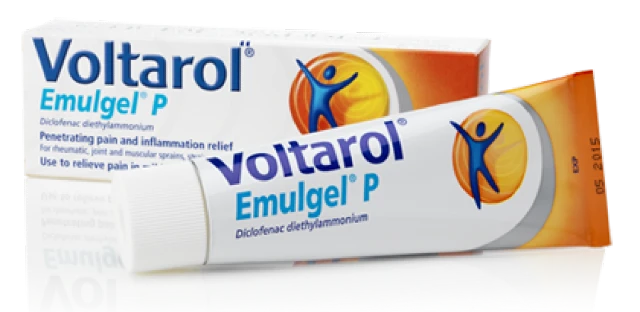Coincidentally, my recent posts about gout remedies for pain relief requires another – this time it is diclofenac for gout.
Diclofenac is one of many NSAIDs (Non-Steroidal Anti-Inflammatory Drugs) that are suitable for any kind of inflammatory pain. As they fight inflammation, they are often prescribed for gout.
It seems to me, that the selection of a NSAID has more to do with a doctor’s prescribing habits than anything else. In essence, this is bound to happen. There is limited research into comparing NSAIDs as they are all quite similar. If doctors find something that presents more benefits than problems, they are likely to stick with it. So if diclofenac works, then there is little point switching to something else.
I also believe that trying to champion one NSAID for gout over another completely misses the point. It is far more important to plan a gout treatment program that recognizes the part that NSAIDs play. The NSAID must be a temporary solution to cover the months that gout patients are at risk until their uric acid is reduced to a safe level – 5 mg/dL (0.30mmol/L), or below. The NSAID might be part of a combination relief that supports colchicine. It might, in turn, need support from other compatible pain-blocking analgesics.
So, if all NSAIDs are similar, is there any point in discussing diclofenac for gout?
I believe there is a need to discuss diclofenac for gout patients because the dosage is vital. In some countries, diclofenac is available Over The Counter (OTC – non-prescription), often under the Voltaren brand. But it does not matter where you buy from – dosage is vital.
If your dose is insufficient for gout (as many OTC doses are where it is available) you do not get relief. If you overdose, you die.

As with other specific pain relief products that I have started new discussion topics for, I am happy to clarify the role of pain relief in your gout treatment plan. But, though dosage is vital for gout pain, guidelines are not clear.
Personally, I am familiar with ibuprofen, but I have no experience of diclofenac in the context of gout pain relief. As with other types of gout remedies for pain, I would love to hear what your doctor is prescribing for you.
Though I am particularly interested in prescribed doses, please feel free to discuss any aspect of diclofenac for gout here.
Hi all,
I found this forum while searching on the net for gout treatment. Found it excellent and useful. Thanks Keith!!
My UA level is running around 11-13 mg/dL and right now I am suffering for last five days.
I have been controlling the same by having chicken, wine and fruits. But I think the time for treatment has come.
I am 31 yrs old. My doc has given me Diclofenac 50 mg (thrice a day) for 5 days and he says that it will be fine. Any advice as to the difference between Colchicine and diclofenac.
Hi Ravi, thank you for your kind words – it makes a real difference to me when I know that what I am doing has value to some people. I think your question is excellent, and deserves a topic especially for diclofenac, so I moved it here.
I am trying to streamline my advice on gout treatment, and I hope to make the difference between colchicine and diclofenac very clear, because it is important, yet widely misunderstood.
Colchicine is effective for gout patients, as it strikes at the heart of the cause of gout pain. But removing, or limiting, the cause has no immediate effect on existing pain. Colchicine restricts the increase of inflammation, but it does not stop pain. Existing inflammation will subside naturally in a few days, but anti-inflammatory drugs will shorten this time period considerably.
Dosage is key here, because you have to strike a balance between unhealthy overdose, and ineffective underdose. Gout attacks are an intense form of inflammation and require a bit more than average of any NSAID, but not too much to kill you.
At the moment, I have insufficient information to know if 150mg per day of diclofenac for gout is the right amount. I will continue to research this, and I hope other gout patients will contribute their experiences. In the meantime, I think we must trust your doctor and follow the combination of gout remedies that he suggests – with one or two other observations.
Firstly, on the pain front, NSAIDs are great at removing the existing inflammation that colchicine does not touch. However, they need time to get the inflammation down. They reduce the time to pain freedom from days to hours, but is that fast enough? If not, your doctor or pharmacist should advise a pain-blocker that is compatible with your NSAID and colchicine. Listen to the voice of experience – it is 2012 and you do not have to suffer pain from gout. Combination gout remedies for pain relief work great, and I apologize to any gout patient who has other health problems that prevent this freedom-from-pain package.
Secondly, and much more importantly, what are you doing about the 11-13 mg/dL? If you have a plan to get it down to 5 or below, then I’m happy. If not, please join another discussion on lowering uric acid, or start your own if you cannot find a suitable one. (For now, you create a new discussion by selecting Gout Forum Dashboard from the end of the Forums menu above – I’ll think of a quicker way eventually – e.g. Start New Gout Forum Topic.
Thank you for your patience during the forum improvements. Let’s revive the gout discussions and help all concerned find their gout freedom.